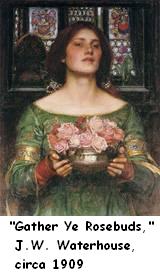"Like Bion and Moschus, I never really wanted to work in administration; however, it paid well." -- Comment from the Head of the English Department at his retirement party.
 Outside my office window,
Outside my office window,
a mockingbird
is grooving on jazz piccolo:
syncopated,
giddy variations
on vernal themes
first scored, I think,
for tenor robin saxophone
in Yardbird Parker's
tense, ironic style.
And all afficionados
of progressive, bebop,
Dixieland or rag,
especially all lovers
of the blues
can dig the Mocker's hip salutes
 to all the other Birds --
to all the other Birds --
those grace notes from old Sparrow,
the Blue Jay's screaming jive,
the reedy Pigeon purrs,
and those moaning low notes
from the Crow.
Such moods and tropes
are pastoral, i.e.,
the way I feel
when April Monday birds
are jazzing in the wind,
improvising close duets,
creating subtle rhythms,
stirring up the leaves,
and getting with it
on the same Spring day
my desk is stacked:
 a memo from the Dean
a memo from the Dean
is perched atop a budget form
that rests upon
a requisition blank
which covers up a dreary list
of meetings for the week.
It's pastoral sans shepherds
and their bleating sheep
and oaten pipes,
without the silly weeping nymphs,
without the laurels, myrtles
and the gentle Muse.
For God's sake,
no one's newly dead.
There is no Lycidas or Thyrsis
cut untimely off
from youth and joy.
It's just that
things are not quite right today,
or -- maybe --
late and soon,
old Wordsworth's too much with me.
Meanwhile,
tree-top high and rocking
in his flippant major key,
old Mocker's
laying down slick versions
of those old familiar tunes --
the Gather Rosebuds riff,
the Time's a-Flying Boogie,
the Here Then Gone Tomorrow Stomp,
the Carpe Diem Blues.
-- Warren F. O'Rourke, 1990